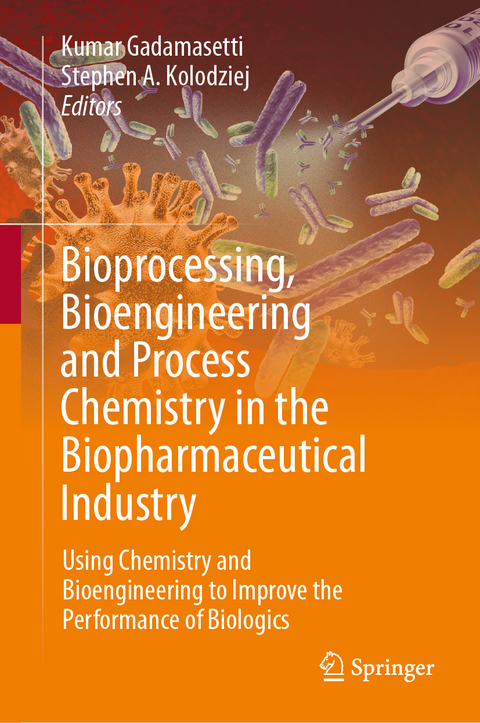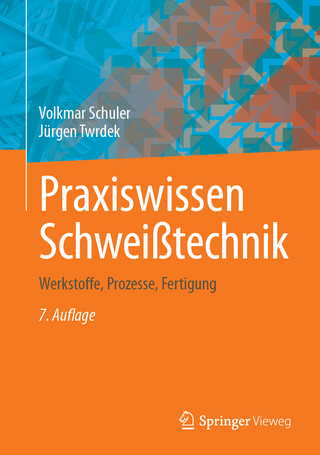
Bioprocessing, Bioengineering and Process Chemistry in the Biopharmaceutical Industry
Springer International Publishing (Verlag)
978-3-031-62006-5 (ISBN)
This book outlines how advances in the diverse scientific and engineering disciplines of synthetic biology, DNA synthesis, production of protein therapeutics, and bioinformatics have led to the commercialization of new complex biotherapeutic modalities in modern era, including monoclonal and multi-specific antibodies, antibody drug conjugates (ADC), fusion proteins, CAR-T and CRISPR technologies and applications, mRNA vaccines and more. Enabling operations to bring these life-changing medicines into the hands of the needy patients include regulatory submissions to authorities across the globe, as well as streamlined production across manufacturing networks deemed necessary and are outlined in dedicated chapters. Bioprocessing, Bioengineering and Process Chemistry in the Biopharmaceutical Industry: Using Chemistry and Bioengineering to Improve the Performance of Biologics captures the state of the art for many of these new modalities, offering innovative approaches to treat, prevent, and in some providential cases, cure the disease. This book will be of significant interest for many disciplines engaged jointly as teams convergently in delivering these medicines: bioprocess engineers, biologists, chemists, bioengineers, genetic engineers, healthcare professionals, regulatory bodies, among pharmaceutical industry professionals as well as in academic circles.
Stephen A. Kolodziej is an Associate Research Fellow in the Biotherapeutics Pharmaceutical Sciences division of Pfizer at the Chesterfield Missouri site. His group develops downstream manufacturing processes for biotherapeutic drug and vaccine candidates, specializing in protein conjugates. He made major contributions to process and product understanding on late-stage bacterial vaccine projects, including multivalent capsular polysaccharide conjugate vaccines against pneumococcus, staphylococcus, and meningococcus. He started his professional career as a medicinal chemist in Searle, Pharmacia, and then Pfizer developing novel small molecule candidates for the treatment of inflammation, cancer, and cardiovascular disease. He applied the tools of combinatorial chemistry to produce small libraries of candidates for evaluation in numerous preclinical programs and was a coinventor for Xalkori®, an ALK inhibitor approved for the treatment of non-small cell lung cancer. Steve has a BA and a PhD in Organic Chemistry from the University of Missouri-St. Louis with Professor Rudolph E. K. Winter on the synthesis of natural products.
Kumar Gadamasetti is currently the CEO of Certum Bio located in the San Francisco Bay area in CA-USA. Current interests are in the area of small molecules as well as biologics including Antibody Drug Conjugates (ADCs), building blocks of DNA and expanded genetic alphabet, and process chemistry related to biologics and small molecules. His professional career began at Bristol-Myers Squibb Co, followed by Amgen, Discovery Partners International, X-Mine. He was the founder of Delphian Pharmaceuticals and Certum LLC. He obtained his Ph.D. (1987) from the University of Vermont in organic chemistry of cancer drugs and precursors and has done post-doctoral work at the University of Virginia. He was the founder-chairman (2002-2004) of ACS Prospectives, 'Process Chemistry in the Pharmaceutical Industry'. He was the editor of two volumes titled, 'Process Chemistry in the Pharmaceutical Industry' (ISBN# 0-8247-1981-6, 1999) and 'Process Chemistry in the Pharmaceutical Industry: Challenges in an Ever-Changing Climate' (ISBN#13:978-0-8493-9051-7, 2007). Kumar has been a visiting professor at Catholic University at Louvain, Brussels, Belgium and the Univ. of Pittsburgh, PA-USA and was the invited speaker at Humboldt University, Berlin, Germany. His major accomplishments include his contributions on the development of drug substance (API) and the drug product that helped in launching three products to marketing: 1. Paclitaxel® (Bristol-Myers Squibb) 2. Sensipar® (Amgen) and 3. Duexis® (Horizon Therapeutics).
Bioprocessing, Bioengineering and Process Chemistry in the Biopharmaceutical Industry Using Chemistry and Bioengineering to Improve the Performance of Biologics An Overview.- Synthetic Biology in Drug Development and Beyond.- Increasing the Scalability of DNA Synthesis and Its Key Role in Expanding the Biopharmaceutical Discovery Process.- Advancements in the Manufacture of Monoclonal Antibodies and other Large Molecule Protein Therapeutics Recent Innovations in Cell Culture Technology Enabling Process Intensification.- Process Development and Manufacturing Considerations for Multispecific (Bispecific and Trispecific) Antibodies Case Studies.- Metabolic and process engineering to control glycan structures for biopharmaceuticals produced in cultured mammalian cells.- Even A Worm Will Turn Immunity Following AAV Vector Administration.- COVID-19 Vaccine Manufacturing Processes Making the Molecules to Solve the Pandemic.- CAR T Bioprocessing.- CRISPR Technology and its Application in Therapeutics.- Fusion Proteins Current Status and Future Perspectives.- Development of Antibody Drug Conjugates.- Mylotarg The Journey to FDA Reapproval and Broad International Approval.- Biopharmaceutical Informatics A Strategic Vision for Discovering Developable Biotherapeutic Drug Candidates.- Advanced Data Analytics Application in Bio manufacturing Processes.- Overview of Complexities of Global CMC Regulatory Affairs.- CMC Considerations for Continuous Bioprocess Design, Development and Manufacturing.- Three Decades of Advancements in Technical Transfer of Biologics a Blueprint for Advanced Therapeutics.- Emerging Biopharmaceutical Technologies and Trends.
| Erscheinungsdatum | 27.11.2024 |
|---|---|
| Zusatzinfo | XXIV, 559 p. 129 illus., 105 illus. in color. |
| Verlagsort | Cham |
| Sprache | englisch |
| Maße | 155 x 235 mm |
| Themenwelt | Technik ► Maschinenbau |
| Schlagworte | Biologic drug therapy • Bioprocess • Biotechnology • biotherapeutics • Cell Therapy • gene therapy • monoclonal antibody • Oligonucleotide • Plasmid DNA • Tissue Targeting • Vaccine |
| ISBN-10 | 3-031-62006-2 / 3031620062 |
| ISBN-13 | 978-3-031-62006-5 / 9783031620065 |
| Zustand | Neuware |
| Informationen gemäß Produktsicherheitsverordnung (GPSR) | |
| Haben Sie eine Frage zum Produkt? |
aus dem Bereich


